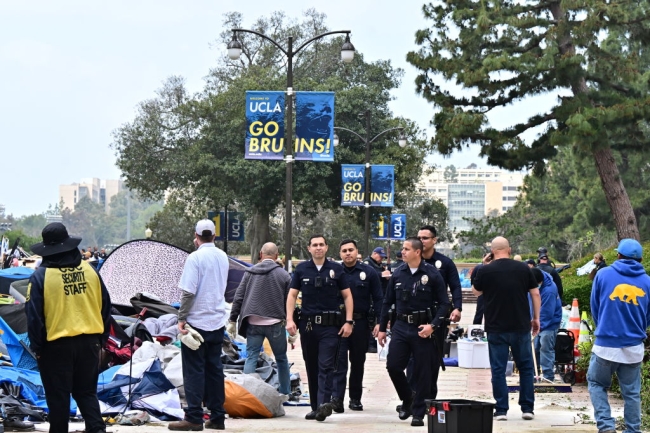You have /5 articles left.
Sign up for a free account or log in.

The University of California, Los Angeles, called in area law enforcement last week to clear a Pro-Palestinian encampment on the campus and arrest students. The university’s chancellor is one of three administrators who will testify before Congress later this month about campus antisemitism.
Photo by FREDERIC J. BROWN/AFP via Getty Images
The top leaders of three universities will head to Capitol Hill this month for something that’s beginning to sound familiar: a widely watched hearing on antisemitism that could, if history repeats itself, unleash more federal scrutiny and politicized attacks on higher education while heightening tensions on campuses nationwide.
The May 23 hearing, titled “Calling for Accountability: Stopping Antisemitic College Chaos,” will mark the third time in six months that Republicans on the House Education and Workforce Committee have summoned college leaders to testify about their responses to campus antisemitism and anti-war protests in support of Palestinians. The leaders of the University of California, Los Angeles, the University of Michigan and Yale University are slated to testify. The hearing comes as students at those institutions, and across the country, have built encampments on their college grounds, occupied buildings and rallied to protest the Israel-Hamas War.
“College is not a park for playacting juveniles or a battleground for radical activists,” Representative Virginia Foxx, the North Carolina Republican who chairs the committee, said in announcing the latest hearing. “Everyone affiliated with these universities will receive a healthy dose of reality: Actions have consequences.”
In the previous hearings, the presidents who faced a grilling by Foxx and her colleagues were relatively new to their leadership posts. This time around, two of the university leaders are seasoned enough that they’re retiring at the end of the academic year: UCLA chancellor Gene Block is stepping down after 17 years at the helm, while Yale president Peter Salovey has occupied his post for 11 years. Michigan president Santa Ono is a relative newcomer in his institution, having begun his term in October 2022—but he helmed two universities prior to arriving in Ann Arbor.
In another notable difference from the first two hearings, the university chiefs under fire won’t come from private schools in the Northeast. Ono and Glock will also be the first leaders of public universities to testify before the committee in these antisemitism hearings.
These hearings not only hold consequences for the institutions and their leaders but also for higher education writ large, particularly as Republicans increasingly view colleges and universities as a politically convenient target in an election year. Just last week, amid the campus unrest, House Republican leaders announced wide-ranging investigations into whether colleges and universities are adequately protecting Jewish students from discrimination and complying with federal civil rights law—and threatened to pull federal funding from institutions that are not.
The heightened Congressional scrutiny has intensified concerns about the erosion of academic freedom—and about whether colleges and universities’ ability to govern themselves going forward.
“It’s an incredibly high-stakes moment for college leaders because they are under intense political pressure,” said Robert Kelchen, professor and head of the educational leadership and policy studies department at the University of Tennessee at Knoxville. Antisemitism “is an issue that is highly polarizing, and it’s highly visible. People have very, very deep personal opinions on the topic. All those put together mean that every single move is watched so closely.”
Universities and their leaders have not fared especially well under that harsh glare thus far. The first hearing helped to take down the presidents of Harvard University and the University of Pennsylvania, who testified in December. Those presidents ran into trouble when they largely defended their students’ right to protest and waffled on what exactly was considered antisemitism. They also didn’t clearly say whether calling for the genocide of Jews violated their campus codes of conduct. Both resigned within a month of testifying.
The committee’s questioning of Columbia University’s president on April 17 led to intense backlash on campus for Minouche Shafik and helped to set off the ensuing wave of nationwide protests, encampments and arrests. Shafik called in the New York City Police Department a day after testifying to clear an encampment on a university’s law that was erected on the morning of her hearing. Shafik remains in her post, but faces calls to resign.
University administrations across the country, including those at UCLA and Yale, have joined Shafik in cracking down on pro-Palestinian protesters, with some calling in the police to clear the encampments. As of Friday morning, more than 2,100 people had been arrested, according to an Associated Press tally. Republicans, Democrats and President Biden have all sharply criticized the protests.
With so much tumult happening on so many campuses, why has the committee chosen to shine a spotlight on these three institutions and their presidents? The hearing announcement didn’t indicate why exactly these three universities were called. None of them are currently under investigation by the committee, which has opened numerous inquiries into campus antisemitism at other institutions.
The Education Department’s Office for Civil Rights has, however, opened investigations into all three universities, responding to complaints about discrimination based on shared ancestry, which includes Jews and Muslims alike and is prohibited under Title VI of the Civil Rights Act of 1964. Since the start of the Israel-Hamas war Oct. 7, OCR has opened more than 130 such investigations.
Students at the three universities have set up encampments in recent weeks to protest the war in Gaza. At UCLA, pro-Israel counterprotesters launched fireworks into the encampment overnight last Tuesday and allegedly assaulted students. A group of student journalists at UCLA also said they were assaulted. Campus police and other area law enforcement, after failing to respond to the clash among protesters and counterprotesters, cleared the encampment Wednesday night.
At Yale, a Jewish student claimed last month that she was stabbed in the eye by a Palestinian flag, a report that conservative media has amplified. Yale police have also moved to clear encampments and arrest students.
Meanwhile, the University of Michigan has been more hands-off. No students have been arrested as its encampment enters its second week, according to MLive.com. Before the encampments, Pro-Palestinian protesters interrupted Ono’s speech at the annual Honors Convocation, which appeared to prompt the drafting of a new policy aimed at preventing disruptive activities from interfering with university operations and events.
There’s a lot on the line, of course, for the particular universities summoned to testify. Kelchen noted that the leaders’ performance at the hearings could impact enrollment, donations and—for the public institutions—state funding. In navigating the hearing, he said leaders will essentially have to choose who they’d prefer to anger: students and faculty, or legislators and donors.
“There are two winning strategies to get through the hearing,” he said. “One is to hope that one of the other panelists stumbles more and gets most of the attention. Basically, can you outrun the bear of congressional hearings while it’s chasing all three of you? The second strategy is basically to say whatever the politicians want, but then you have an issue back on campus.”
Shafik is under fire from students and faculty who believe she adopted the second strategy, essentially telling House Republicans what they wanted to hear. The Columbia president forcefully denounced antisemitism and condemned comments from faculty members who’d spoken out against Israel—but was then accused of throwing those professors under the bus, eroding academic freedom and shared governance at Columbia. Then she asked NYPD to clear the campus encampment.
While they’ve been fraught for the leaders and institutions being spotlighted, Kelchen said that the hearings have been a “winning strategy” for House Republicans. That means this next one won’t likely be the last. Fighting campus antisemitism has given members a chance to score political points in an election year, to air their grievances against higher education—particularly elite “liberal” institutions—and to drive national headlines.
“Higher ed is already a punching bag, and this is a moment where higher ed is in the spotlight,” he said. “Members of Congress like to live in the spotlight. They want attention for these hearings, and they’re going to get it.”








